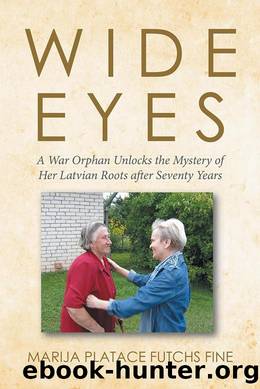Wide Eyes by Marija Platace Futchs Fine

Author:Marija Platace Futchs Fine [Fine, Marija Platace Futchs]
Language: eng
Format: epub
ISBN: 9781514436998
Publisher: Xlibris US
Published: 2016-04-07T04:00:00+00:00
Bloom, bloom, oh rye ear
With nine branches
My brothers are building a barn
With nine compartments
Make what you make, my brothers
But build me a room
With three doors
Sun rises through one
And sets through another
I walk through the third
Myrrh wreath on my head
Solomeja
While HelÄna, Leonora, and Kazimirs struggled to rebuild their lives after repatriating to Soviet Latvia, my mother remained in Germany along with sixty thousand other survivors of the German concentration camps.
They represented a tiny fraction of the total number of displaced persons, or twelve million. DP camps were in Germany, Austria, Italy, and other countries. One camp was even set up in North America, in Guanajuato, Mexico.5 The lives of millions of refugees went on for the better part of a decade in these holding centers.
My mother and I were among the 83,111 Baltics in British DP camps. Estonians were the smallest Baltic group, with 13,059, or fifteen percent. Lithuanians numbered 23,555, or twenty-three percent. The Latvians, the largest group, numbered 45,497, representing nearly fifty-seven percent of the overall total.6
Allied forces placed us into improvised shelters that ran the gamut, from former barracks, to summer camps for children, airports, hotels, castles, hospitals, private homes, and even partly destroyed structures. There were thousands of facilities, which Allies tried to name assembly centers. They wanted to avoid the hated term of camps associated with the despised concentration camps from which many of the survivors had come and were now refugees. But in the end, the term camp stuck.
Rendsburg DP Camp
My mother chose to stay in a German DP camp for the next eighteen months, reasons for which I can only form tentative explanations. Those reasons did not even come up in the standard exit interrogations she had with the Soviets at the time she decided to return to Latvia.
Health professionals who observed the behavior of women whoâlike my motherâlost a child in concentration camps, made some observations about their behavior and how they overcame their loss. Some case workers found that these women exhibited defeminization, a decline in the maternal instinct and an unconcern for their bodies. One UNRRA worker wrote,7
Download
This site does not store any files on its server. We only index and link to content provided by other sites. Please contact the content providers to delete copyright contents if any and email us, we'll remove relevant links or contents immediately.
Spell It Out by David Crystal(36109)
Underground: A Human History of the Worlds Beneath Our Feet by Will Hunt(12085)
A Year in the Merde by Stephen Clarke(5412)
Venice by Jan Morris(2568)
Claridge's: The Cookbook by Nail Martyn & Erickson Meredith(2398)
My Paris Kitchen: Recipes and Stories by Lebovitz David(2290)
A TIME OF GIFTS by Patrick Leigh Fermor(2201)
The Plantagenets by Dan Jones(2085)
Welcome to the Goddamn Ice Cube by Blair Braverman(2042)
The Finnish Way by Katja Pantzar(1993)
Top 10 Prague (EYEWITNESS TOP 10 TRAVEL GUIDES) by DK(1985)
Bang Poland: How To Make Love With Polish Girls In Poland by Roosh V(1971)
From Russia with Lunch by David Smiedt(1970)
The Isle of Mull by Terry Marsh(1945)
A TIME TO KEEP SILENCE by Patrick Leigh Fermor(1898)
Rick Steves London 2018 by Rick Steves & Gene Openshaw(1864)
A Taste of Paris by David Downie(1856)
Insight Guides Experience Tokyo by Insight Guides(1854)
Merde in Europe by Stephen Clarke(1766)
